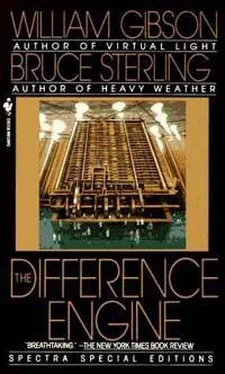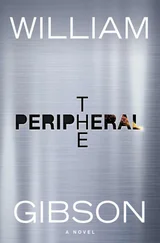William Gibson - The Difference Engine
Здесь есть возможность читать онлайн «William Gibson - The Difference Engine» весь текст электронной книги совершенно бесплатно (целиком полную версию без сокращений). В некоторых случаях можно слушать аудио, скачать через торрент в формате fb2 и присутствует краткое содержание. Жанр: sf_cyber_punk, fantasy_alt_hist, на английском языке. Описание произведения, (предисловие) а так же отзывы посетителей доступны на портале библиотеки ЛибКат.
- Название:The Difference Engine
- Автор:
- Жанр:
- Год:неизвестен
- ISBN:нет данных
- Рейтинг книги:3 / 5. Голосов: 1
-
Избранное:Добавить в избранное
- Отзывы:
-
Ваша оценка:
- 60
- 1
- 2
- 3
- 4
- 5
The Difference Engine: краткое содержание, описание и аннотация
Предлагаем к чтению аннотацию, описание, краткое содержание или предисловие (зависит от того, что написал сам автор книги «The Difference Engine»). Если вы не нашли необходимую информацию о книге — напишите в комментариях, мы постараемся отыскать её.
The Difference Engine — читать онлайн бесплатно полную книгу (весь текст) целиком
Ниже представлен текст книги, разбитый по страницам. Система сохранения места последней прочитанной страницы, позволяет с удобством читать онлайн бесплатно книгу «The Difference Engine», без необходимости каждый раз заново искать на чём Вы остановились. Поставьте закладку, и сможете в любой момент перейти на страницу, на которой закончили чтение.
Интервал:
Закладка:
ALG, COMP, and MOD had subsequently become a fabulous three-headed beast, frequent visitor to the higher fields of Oliphant's imagination. His discovery of the probable meaning of this cipher, while examining transcripts of the interrogation of William Collins, had failed to dispel the image; Alg-Comp-Mod was with him still, a serpent-necked chimera, its heads nastily human. Radley's face was there, quite dead, mouth agape, eyes blank as fog, and the cool marble features of Lady Ada Byron, aloof and impassive, framed by curls and ringlets that were proofs of a pure geometry. But the third head, sinuously swaying, evaded Oliphant's gaze. He sometimes imagined its face was Edward Mallory's, resolutely ambitious, hopelessly frank; at other times he took it to be the pretty, poisonous visage of Florence Bartlett, wreathed in fumes of vitriol.
And sometimes, particularly as now, in the rubber bath's cloying embrace, drifting toward the continent of sleep, the face was his own, its eyes filled with a dread he could not name.
The following morning, Oliphant slept in, then kept to his bed, Bligh supplying him with files from the study, strong tea, and anchovy toast. He read a Foreign Office dossier on one Wilhelm Stieber, a Prussian agent posing as an emigre newspaper editor named Schmidt. With considerably more interest, he read and annotated a Bow Street file detailing several recent attempts to smuggle munitions, each incident involving cargo destined for Manhattan. The next file consisted of Engine-printed copies of several letters from a Mr. Copeland, of Boston. Mr. Copeland, who traveled in lumber, was in British pay. His letters described the system of forts defending the island of Manhattan, with extensive notes on ordnance. Oliphant's gaze, from long practice, slid lightly over Copeland's account of the south battery on Governor's Island, something of a relic by the sound of it, and quickly arrived at a report of rumors that the Commune had strung a chain of mines from the Romer Shoals to the Narrows.
Oliphant sighed. He very much doubted that the channel had been mined, but the leaders of the Commune would certainly wish it to be thought to have been mined. As indeed it might soon be, if the gentlemen of the Commission for Free Trade were to have their way.
Bligh was at the door.
"You've an appointment with Mr. Wakefield, sir, at the Central Statistics Bureau."
An hour later, Betteredge greeted him from the open door of a cab. "Good afternoon, Mr. Oliphant." Oliphant climbed in and settled himself. Pleated shades of black-proofed canvas were drawn firmly across either window, shutting out Half-Moon Street and the stark November sun. As the driver urged the cab-horse forward, Betteredge opened a case at his feet, took out a lamp, which he lit in a rapid and dextrous fashion, and fixed, with a brass apparatus of screws and bolts, to the arm of the seat. The interior of the case glittered like a miniature arsenal. He passed Oliphant a crimson file-folder.
Oliphant opened the file, which detailed the circumstances of the death of Michael Radley.
He had himself been in the smoking-room with the General and poor doomed Radley, the both of them awash with drink. Of their respective styles of drunkenness, Radley's had been the more presentable, the least predictable, the more dangerous. Houston, in his cups, delighted in playing the barbarous American; red-eyed, perspiring, foul-mouthed, he lounged with one great coarse boot propped muddily atop an ottoman. As Houston spoke, and smoked, and spat, roundly cursing Oliphant and Britain, he sullenly shaved curls from a bit of pine, periodically pausing to strop the jack-knife on the edge of his boot-sole. Radley, in contrast, had positively quivered with the liquor's stimulant effect, cheeks flushed and eyes flashing.
Oliphant's visit had been intended deliberately to disturb Houston on the eve of his departure to France, but the display of ill-concealed mutual hostility evident between the General and his publicist had been quite unexpected.
He had hoped to sow seeds of doubt with regard to the French tour; to this end, and primarily for Radley's benefit, he had managed to imply an exaggerated degree of cooperation on the parts of the intelligence services of Britain and France. Oliphant had suggested that Houston already possessed at least one powerful enemy among the Police des Chateaux, the bodyguard and secret personal agency of the Emperor Napoleon. While the Police des Chateaux were few in number, Oliphant insinuated, they were utterly without legal or constitutional restraint; Radley, at least, in spite of his condition, had obviously taken note of the implied threat.
They had been interrupted by a page, who brought a note for Radley. As the door opened to admit the man, Oliphant had glimpsed the anxious face of a young woman. Radley had stated, as he excused himself, that it was necessary that he speak briefly with a journalistic contact.
Radley had returned to the smoking-room some ten minutes later. Oliphant then took his leave, having endured an extended and particularly florid tirade from the General, who had consumed the better part of a pint of brandy during Radley's absence.
Summoned back to Grand's by telegram in the early hours of dawn, Oliphant had immediately sought out the hotel-detective, a retired Metropolitan named McQueen, who had been called to Houston's room, number 24, by the desk clerk, Mr. Parkes.
While Parkes attempted to calm the hysterical wife of a Lancashire paving-contractor, resident in number 25 at the time of the disturbance, McQueen had tried the knob of Houston's door, discovering it to be unlocked. Snow was blowing in through the demolished window, and the air, already chilled, stank of burnt gunpowder, blood, and, as McQueen delicately put it, "the contents of the late gentleman's bowel." Spying the scarlet ruin that was Radley's corpse, all too visible in the cold light of dawn, McQueen had called to Parkes to telegraph the Metropolitans. He then used his passkey to lock the door, lit a lamp, and blocked the view from the street with the remains of one of the window-curtains.
The condition of Radley's clothing indicated that the pockets had been gone through. Sundry personal objects lay in the pool of blood and other matter surrounding the corpse: a repeating match, a cigar-case, coins of various denominations. Lamp in hand, the detective surveyed the room, discovering an ivory-handled Leacock & Hutchings pocket-pistol. The weapon's trigger was missing. Three of its five barrels had been discharged—very recently, McQueen judged. Continuing his search, he had discovered the gaudy gilded head of General Houston's stick, awash in splintered glass. Nearby lay a bloodied packet, tightly wrapped in brown paper. It proved to contain a hundred kinotrope-cards, their intricate fretting of punch-holes ruined by the passage of a pair of bullets. The bullets themselves, of soft lead and much distorted, fell into McQueen's palm as he examined the cards.
Subsequent examination of the room by specialists from Central Statistics—the attention of the Metropolitan Police, at Oliphant's request, having been swiftly deflected from the matter—added little to what the veteran McQueen had observed. The trigger of the Leacock & Hutchings pepperbox was recovered from beneath an armchair. A more peculiar discovery consisted of a square-cut white diamond, of fifteen carats and very high quality, which was found firmly wedged between two floor-boards.
Two men from Criminal Anthropometry, no more than usually cryptic about their purposes, employed large squares of tissue-thin adhesive grid-paper to capture various hairs and bits of fluff from the carpet; they guarded these specimens jealously, and took them away promptly, and nothing was ever heard of them again.
"Are you done with that one, sir?"
Читать дальшеИнтервал:
Закладка:
Похожие книги на «The Difference Engine»
Представляем Вашему вниманию похожие книги на «The Difference Engine» списком для выбора. Мы отобрали схожую по названию и смыслу литературу в надежде предоставить читателям больше вариантов отыскать новые, интересные, ещё непрочитанные произведения.
Обсуждение, отзывы о книге «The Difference Engine» и просто собственные мнения читателей. Оставьте ваши комментарии, напишите, что Вы думаете о произведении, его смысле или главных героях. Укажите что конкретно понравилось, а что нет, и почему Вы так считаете.









